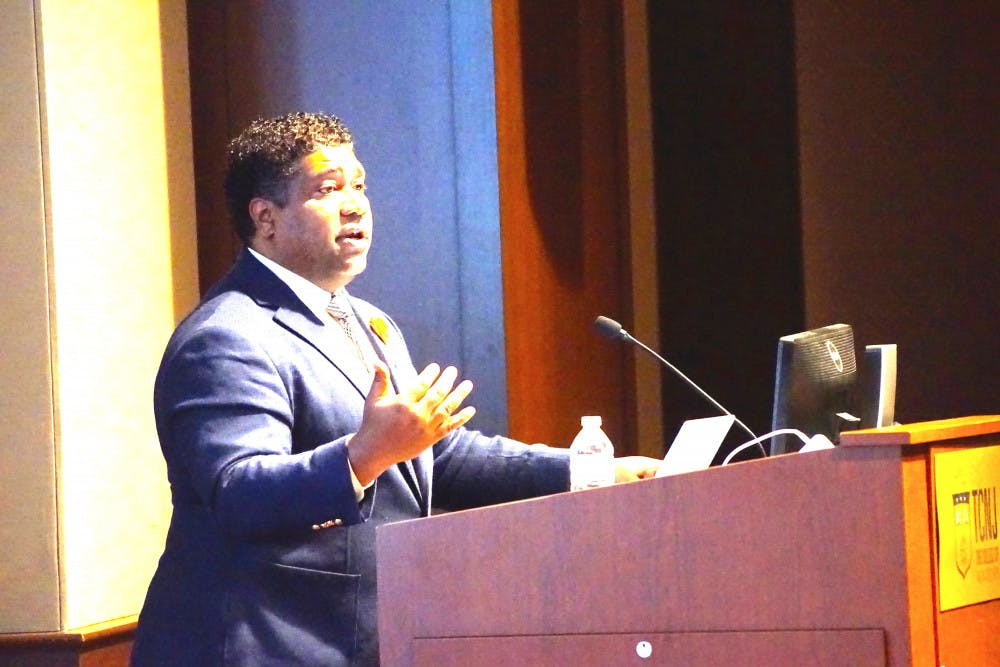By Nicole Viviano
News Editor

The Office of Institutional Diversity, Equity, and Inclusion welcomed Damon Williams of the Center for Strategic Diversity Leadership & Change on Friday, April 26 in the Library Auditorium at 12:30 p.m. to share his analysis of the College’s current diversity structure and his recommendations for the future of the community.
The lecture was part of a series of regular updates issued from the OIDEI regarding current steps being taken by the College toward solidifying the job descriptions and positions of the diversity team members.
According to a campus-wide email from Acting Vice President of Institutional Diversity, Equity, and Inclusion Ivonne Cruz, Williams has been hired as an outside consultant to contribute to building a more diverse and inclusive campus community. He met with several members in administration on April 2 to collaborate on specific issues regarding diversity and inclusion on campus.
Having worked with more than 1,000 colleges and universities and having conducted extensive research on the role of diversity on college campuses, he recommended that the College implement a role of Chief Diversity Officer, along with a supportive team and school.
“I think the power of a person from outside coming in to look at us and hold up a mirror is that they can see things that we sometimes can’t see ourselves,” said College President Kathryn Foster, who was in attendance.
Williams broke down the elements necessary to build a successful diversity and inclusion plan. Comparing the role of CDO to a triangle offense in basketball, one in which every player gets to touch the ball, Williams detailed the necessity of teamwork in all stages of forming a game plan.
“It’s not about one person, it’s about that person playing a particular role with a team in a collegiality within a culture to move an agenda,” Williams said.
Williams explained how the CDO is meant to be a complimentary nomenclature rather than being a standalone title. The position is not a top-down role, but rather an integrative one that connects many resources and people. Rather than a tenure administrator, the CDO requires an expert in diversity with a grounded definition of duties.
Many representatives of College offices and organizations were in attendance, including Senior Director of Facilities Operations Maritza McGraw, who described Williams as dynamic and informative.
“I appreciate that he focused on so many topics that are relevant to us here at the College and everywhere in our lives,” she said.
Williams made it a point during his talk to commend both Foster and the OIDEI office for hiring him and how they responded to the racial incidents late last semester. He described his work and data as pre-work or readiness work, which looks to promote a more successful and fast-acting OIDEI in the future.
Williams’ research laid out common misconceptions and various challenges regarding the CDO role. A Lack of proper resources, job title misconceptions and unaccountability in leadership can put roadblocks around partnership opportunities at an institution.
“We have to create a public accountability and public conversation that asks leaders to stand forward and say, ‘This is what I’m doing, this is what I’m not doing,’” Williams said.
However, according to Williams, with a thought-out growth plan that implements accountability on campus and by mandating diversity and inclusion goals as part of annual reviews and performance systems, those mistakes can be resolved.
Williams said his research showed that a great diversity and inclusion team has already taken shape at the College, which will produce the strength needed to build up the diversity plan.
In a brief exchange between Foster and Williams after the lecture, the College’s president expressed excitement to see the comprehensive report and continue working together.
A video of the lecture in its entirety can be found on the OIDEI’s website. Williams reminded the audience of the simple gestures that could further promote the new diverse and inclusive College culture.
“We got to stop telling people they’re broken and flawed,” Williams said. “And we got to start lifting people up, saying we need you to be a great teacher, we want you to be a better leader and a better citizen and a better staff member.”
In her email, Cruz also linked the College’s developed bias response form created for students to report incidents of bias that they encounter. The form can now be found on OIDEI’s website.







